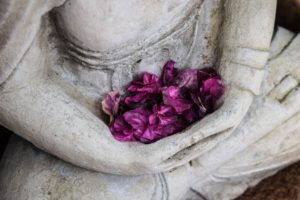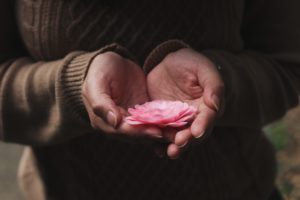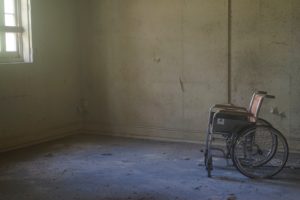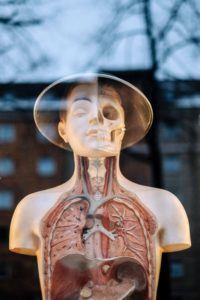by Jenny Rose | Mar 21, 2019 | Emotional Intelligence
Once I lived with an avid outdoorsman who fished and hunted. He frequently spent his weekends camping during spring, summer and fall. I knew how much pleasure he took in this time away from the rest of his life, and always saw him off with some variation of “Have a great time.”
It never failed to make him mad.
He said it “put pressure” on him when people wished him well.
I felt both dumbfounded and amused by his attitude. I couldn’t imagine feeling insulted because someone who loves you wishes you a great time.
I’ve been remembering that man this week because I’ve been thinking about giving and receiving blessings.

Photo by Chris Ensey on Unsplash
Traditionally a blessing was an important social exchange. If one was lucky enough to meet an incognito god or goddess on the flanks of Mount Olympus or in some other lonely place and received their blessing, they were broken open to receive it fully, their deepest and most private hopes, fears and pain exposed. It took courage, strength and humility to receive such a gift.
The poet David Whyte suggests we must make ourselves large for the exchange of blessings. To give such a favor is an act of generosity. To receive it is an act of growth. In the last several days I’ve thought a lot about making oneself big enough for blessings. I’ve remembered specific words and ways in which I’ve blessed others, including the simple blessing of my love.
Sometimes I’ve felt the love I gave another in words and actions was recognized, appreciated and fully received. Other times I have not, and I’ve always made that about me. My love was unwelcome and had no value. Now I wonder, though. Perhaps it wasn’t me at all. Perhaps they were not big enough in that moment to accept my blessing.
That thought leads me inexorably to wondering how many times I have not been big enough to receive a blessing from someone else. I’m forced to admit there have been plenty of times; probably many more than I’m aware of.
Am I big enough to be loved hugely, or receive a large sum of money or have my creative hopes realized?

Photo by Joshua Earle on Unsplash
I’m not sure I am. I’m big enough to be loved moderately, but hugely? No, that feels like too much. I can feel myself tensing, rounding, drawing my knees up and wrapping my arms around my body as I imagine someone trying to give me huge love. I’m not worth that. I’ll be sure to disappoint. They’ve mistaken me for someone else.
I’m too small for such abundance. I choose to be too small. I’m afraid to stand up straight, open my arms and heart wide, and accept huge love. I choose to limit what comes in. I’m afraid of the pain of being broken open. I can make myself bigger in spite of my fear, but I usually don’t in order to accommodate a blessing.
Therefore, I impoverish myself. I have people around me who love me. Perhaps they love me as deeply as I love, and they long for me to receive it as I long for my love to be received, but my own inability to be large enough to allow their blessing into my life makes the energy of their love impotent and weakens our connection. My fear and choice to be small, hard and rigid, like a rolled-up porcupine, not only limit me; they limit others as well.
My most frequent prayer on behalf of others is that they might experience the greatest good. I use that specific language because I know I don’t know what the greatest good is for any of us. Sometimes what we want the most in life is not in our best interests. Sometimes the hardest experiences are the most useful to us. Sometimes what we long for is what we most need. I don’t know. I’m not big enough to know. I can’t see far enough down the road to judge the value in any experience. All I can say, along with everyone else, is what feels pleasant and what feels uncomfortable to me in the moment.
Oxford online dictionary defines blessing as “a beneficial thing for which one is grateful; something that brings well-being; a person’s sanction or support.” We all can make a list of crises in our lives that later turned out to be blessings in disguise. Maybe it’s all a blessing – each breath, each heartbeat, each tear, each drop of blood and sweat, each moment, each life and death. Gratitude is a practice encompassing all our experience.

Photo by Ester Marie Doysabas on Unsplash
To receive a blessing is to allow an expression of support, affection and maybe even love touch us. It’s an act of trust in the intention of the one who blesses us, as well as faith in our own worth. We need one another in this life, and healthy reciprocity makes connections stronger. It’s not enough to be the strong one who maintains safety by extending love and support while accepting none; we must also be willing to be down and out, to be lost and confused, and to receive help and encouragement in our turn.
Last weekend two friends and my partner helped me empty out my flooded storage unit, chip ice, sweep water, put down pallets (transported in my friends’ truck), and put everything back again. We were ankle-deep in mud, slipped and slid on ice and splashed around in water as we worked. It needed to be done and I wanted to do it. I know I needed help. Yet from the beginning I was blocking the support and caring around me. I fussed about my friends using their Saturday to undertake such a messy job. I felt bad about using their truck. I was worried somebody would hurt their back heaving my wet mattress and box springs around. At the same time, I was deeply touched and uncomfortable because I could feel their caring and concern and I didn’t know how to take it gracefully. I wanted to be big enough to accept friendship and love from these dear ones, but it was really hard. I know, however, I’m not good at receiving and I want to be better. I also know, had our positions been reversed, I would have greatly enjoyed helping out a friend on a windy spring Saturday morning.
I endured my discomfort. Now that it’s done, what I will remember is not what was damaged and lost, or even the mess. What I’ll remember is the four of us tackled a necessary job, worked together and had a good time doing it.

Photo by Juan Pablo Rodriguez on Unsplash
It was a blessing. I stretched as wide as I could to receive it.
I need more practice.
When I tell someone I love them, or wish them a great day, or the greatest good, I mean it. It’s not just words. My heart is in it. When I light a candle and reach out with all I am to a loved one who is far away, I’m offering the best I am as a blessing, a candle in dark times, a comfort in distress. I want the gift of my love and support to be received and used.
Probably the best place to start is to learn to receive with more grace myself, to expand, and to humbly accept whatever blessings come my way, whether plainly visible or in disguise.
Have a great day, readers. Greatest good to you. Blessings.

Photo by Stephen Leonardi on Unsplash
All content on this site ©2019
Jennifer Rose
except where otherwise noted
by Jenny Rose | Nov 8, 2018 | A Flourishing Woman, Body
The pool where I work is part of a rehabilitation center, which is part of a local hospital. There are actually two pools. One is a lap pool of about 84 degrees. The other is a large therapy pool, nearly as big as the 4-lane lap pool. The therapy pool is about 94 degrees. The pool patrons are a mix of the public, hospital staff and rehab patients.
As a lifeguard, I spend hours in an elevated chair watching people in the water and moving around on the deck. It delights me to be paid for doing what I naturally do in the world, which is to people watch. In an environment with a consistent air temperature over 80 degrees with more than 50% humidity, all of us — staff, patrons and patients — are necessarily without our usual armor of clothing, make-up and jewelry. We are physically revealed to one another to an unusual degree in a public place.
I’m struck every day by the humility of flesh, the wonder and complexity of our physical being; the almost painful innocence of small children with their rounded, unselfconscious forms; the incredible and paradoxical endurance, resilience and fragility of the human body, and the inexorable truths our unconcealed bodies reveal.
I’m touched by the everyday, patient, humble courage of people whose bodies are ill, injured and aging. I watch people participate in classes: Water walking, water aerobics, arthritis and fibromyalgia in the therapy pool, and swim lessons. I watch couples and families, caregivers and their charges, school groups and special needs groups. People come to lose weight, to rehabilitate after a stroke or cardiac event, to increase their strength and endurance, to recover from surgery or injury. People also come to socialize, to play, and to be inspired and motivated by staff, classes, music and one another.

Photo by Doug Maloney on Unsplash
Some folks swim laps. Others water walk and go through exercise routines with buoys, kickboards and weights. They come out of the locker rooms with walkers, canes and wheelchairs. Some need help getting in and out of the pool, or even down to the pool from the parking lot.
For the most part, people who make use of the facility are patient, pleasant and good-natured. Watching them, I wonder at their resilience. What must it be like to be so bent one can only see the floor? How does one cope when the only ambulation possible is to creep along with a walker? The joy and laughter of a wheel-chair bound young person with contorted and twisted limbs like sticks when she’s carried into the therapy pool make me weep.
There’s really no place to hide in the world, at least from ourselves. We all live in a body, and many of us struggle with loving them, including me. We spend an amazing amount of time, money, anguish and effort in disguising our perceived physical defects from the eyes of the world. We tell ourselves nobody can see our shame. No one can see how unlovely or imperfect we really are. No one will ever know.

Photo by Hailey Kean on Unsplash
But we know, and our shame and self-loathing poison our lives.
I wonder, as I sit in the chair, what is it about the people who use the pool that enables them to risk physical authenticity? Do they love and accept themselves as they are? If so, how have they developed that ability? Are they unconcerned with what others think of them? Are they like me, and simply resigned to their physical reality, feeling the benefits of using the pool are more important than hiding their appearance, but privately ashamed and embarrassed?
In thinking about this, I realize my own relationship with my body is complicated. On the one hand, I feel affection, loyalty and gratitude. I’ve never aspired to beauty, whatever beauty is. On the other hand, I cringe every time I see a picture of myself, which is not often, as I hate having my picture taken and avoid it whenever possible. I think I cringe because I wish I could protect that vulnerable woman from the eyes and criticism of others. I cringe because my deepest and most private shame is that my physical envelope contains some hidden foulness that makes me unworthy of physical affection and contact. I’m not talking about sex. Sexual attraction and desire are a whole different conversation. I’ve been good enough for sex, but not good enough for consistent loving, nurturing touch. Not good enough to hold.

Photo by Liane Metzler on Unsplash
In fact, one of the biggest reasons why I love the water so much is that it touches me.
The shame I feel around this is corrosive and chronic. It’s my intention that it also remain entirely invisible to any onlooker. The pain of this hidden vulnerability of mine enlarges the way I observe others in their bodies. It seems to me we must all have some degree of skin hunger that’s more or less satisfied, depending on our situation. We must all feel some degree of physical isolation and alienation at some point in our lives. Surely every body I see is worthy of care, of love, of touch and nurture, in spite of skin tags, scars, cellulite, bulges and sags, hair distribution or absence, aging, injury and disability, too many or too few pounds.
As I sit on the lifeguard stand, counting heads and scanning the pools, I keep coming back to courage. Courage and humility. The willingness to be seen without the comfort and concealment of clothing. The willingness to be physically authentic and vulnerable. Not a story of courage that will ever be made into a movie, but a kind of daily, humble heroism that touches and inspires me.

Samuel Zeller on Unsplash
As an observer, it’s effortful to discard childish judgements like “ugly” and “beautiful.” It’s hard not to apply an internalized rating system. I’m tainted by Hollywood, by digitally altered images and by my own private romantic fantasies. Somewhere underneath all the limitations imposed by that conditioning and brainwashing, I glimpse a vast compassionate wisdom encompassing all of us. Life, after all, is beautiful and miraculous. Doing what we can to care for and accept the body we have is an act of courage and strength. Allowing ourselves to be seen and vulnerable takes humility and heroism.
I wonder, somewhat uneasily, if we are no longer able to grasp the beauty inherent in our physical forms. We seem determined to approach the planet’s body, our own and the bodies of others as commodities and resources to plunder, manipulate and then discard when they become boring, worn-out, ill or (at least to our eyes) ugly. Perhaps we’ve lost the ability to appreciate and value everybody in every unique, individual body. Maybe our culture is so injured all we can do now is hate, judge and criticize not only ourselves but others.
Perhaps we’re determined to tear ourselves apart and nothing will stop us.
In the meantime, however, I live in a body, just as you do, and we all have a deeply private and largely invisible relationship with our structure of flesh, blood and bone. My choice is to remain present with the wonder and complexity of the human body, yours, mine and theirs. My choice is to enlarge my compassion and observation until I touch that edge of wisdom that acknowledges beauty and worth in all of physical life, be it human, tree or creature.

Photo by Khoa Pham on Unsplash
All content on this site ©2018
Jennifer Rose
except where otherwise noted










